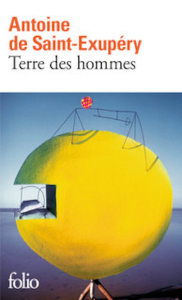
Terre des hommes by Antoine de Saint-Exupéry.
I read it together with its English version (Wind, Sand and Stars) to practice my French and make sure I was understanding everything.
Highlights
From the second day onwards, you see, the hardest thing was to stop myself thinking. I was in too much pain, and my situation was just too desperate. To summon up the courage to keep going, I had to put it out of my mind. But the awful thing was that I couldn’t control my mind; it went on working like a turbine.
What saves a man is to take a step. And another step. It’s the same first step, repeated…
He knows that once men are caught up in an event they have no more fear of it. Only the unknown terrifies men. Once confronted, it is no longer the unknown.
To be a man is, precisely, to be responsible. It is to know shame at the sight of poverty which is not of our making. It is to be proud of a victory won by our comrades. It is to feel, as we place our stone, that we are contributing to the building of the world.
From deep in the chasms of troubled nights, you have willed so often the coming of that pale flower, that gleam of light which rises from the dark lands of the east. Sometimes that miraculous spring has unfrozen slowly before your very eyes, and healed you when you thought that you were dying.
And the life of the past seems a better reflection of our nature, for the simple reason that it is a better reflection of our language.
The fennec goes shopping at dawn. And here I come face to face with a great mystery of nature. My friend the fennec doesn’t stop at every bush. There are some, laden with snails, that he disdains. Others he walks around with evident caution. He does go to some, but without stripping them bare. He takes two or three shells, then moves to another restaurant. […] It all takes place as if he is conscious of the danger. If he ate his fill without considerations, there would be no more snails. No more snails, and no more fennecs.
Only today do I understand the condemned man’s cigarette and glass of rum. I could not come to terms with his acceptance of those paltry gifts. And yet he draws great pleasure from them. If he smiles, people think he is brave. But he is smiling as he drinks his rum. What they do not grasp is that his perspective has shifted, and that out of his final hour he has created a human life.
Of what value to us are those political doctrines that proclaim a new blossoming of mankind, if we do not know at the outset what kind of man they will bring forth? Who will be born? We are not cattle to be fattened for market, and the birth of a Pascal in poverty carries more weight than the arrival of any number of prosperous nonentities.
You can line men up as right wing and left wing, hunchbacks and non-hunchbacks, fascists and democrats, and those distinctions are unassailable. But truth, as we know, is that which simplifies the world and not that which creates chaos. Truth is the language that identifies what is universal.
It may be a fine thing to die for the expansion of territory, but today war destroys what it claims to foster. […] The winner is the one who decomposes last. And they decompose together.
Why hate one another? We stand together, carried along by the same planet, the crew of a single ship. If it is good that civilizations compete to promote new syntheses, it is monstrous that they devour one another.
Only when we become aware of the part we play, even the most unobtrusive part, will we be happy. Only then will we live in peace and die in peace, for what gives meaning to life gives meaning to death.